-
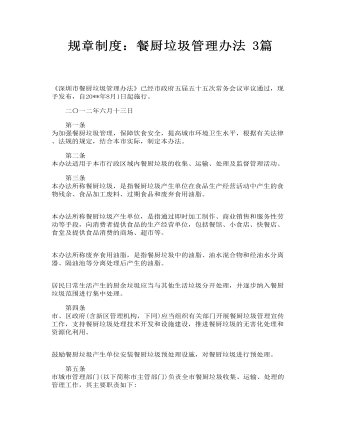
规章制度:餐厨垃圾管理办法 3篇
第二条 本办法适用于本市行政区域内餐厨垃圾的收集、运输、处理及监督管理活动。 第三条 本办法所称餐厨垃圾,是指餐厨垃圾产生单位在食品生产经营活动中产生的食物残余、食品加工废料、过期食品和废弃食用油脂。 本办法所称餐厨垃圾产生单位,是指通过即时加工制作、商业销售和服务性劳动等手段,向消费者提供食品的生产经营单位,包括餐馆、小食店、快餐店、食堂及提供食品消费的商场、超市等。
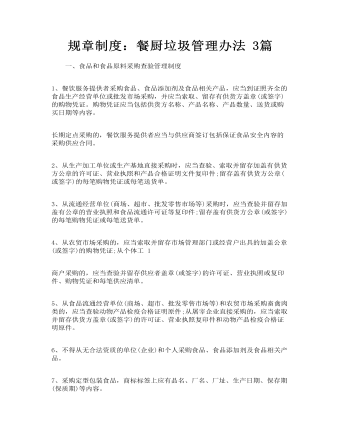
规章制度:餐厨垃圾管理办法 3篇
2、从生产加工单位或生产基地直接采购时,应当查验、索取并留存加盖有供货方公章的许可证、营业执照和产品合格证明文件复印件;留存盖有供货方公章(或签字)的每笔购物凭证或每笔送货单。 3、从流通经营单位(商场、超市、批发零售市场等)采购时,应当查验并留存加盖有公章的营业执照和食品流通许可证等复印件;留存盖有供货方公章(或签字)的每笔购物凭证或每笔送货单。
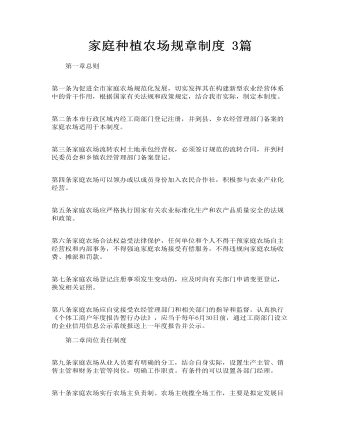
家庭种植农场规章制度 3篇
第二条本市行政区域内经工商部门登记注册,并到县、乡农经管理部门备案的家庭农场适用于本制度。 第三条家庭农场流转农村土地承包经营权,必须签订规范的流转合同,并到村民委员会和乡镇农经管理部门备案登记。 第四条家庭农场可以领办或以成员身份加入农民合作社,积极参与农业产业化经营。
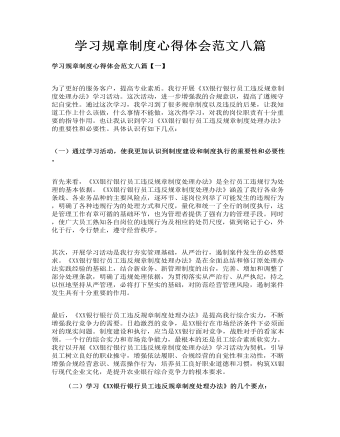
学习规章制度心得体会范文八篇
(一)通过学习活动,使我更加认识到制度建设和制度执行的重要性和必要性。 首先来看,《XX银行银行员工违反规章制度处理办法》是全行员工违规行为处理的基本依据。《XX银行银行员工违反规章制度处理办法》涵盖了我行各业务条线、各业务品种的主要风险点,逐环节、逐岗位列举了可能发生的违规行为,明确了各种违规行为的处理方式和尺度,量化和统一了全行的制度执行,这是管理工作有章可循的基础环节,也为管理者提供了强有力的管理手段。同时,使广大员工熟知各自岗位的违规行为及相应的处罚尺度,做到铭记于心,外化于行,令行禁止,遵守经营秩序。
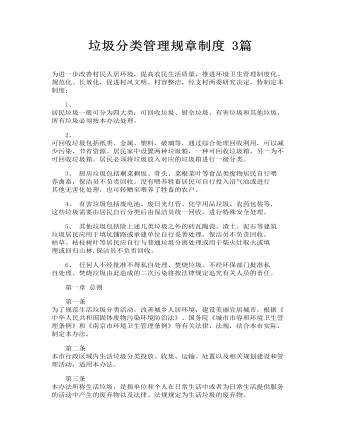
垃圾分类管理规章制度 3篇
1、 居民垃圾一般可分为四大类:可回收垃圾、厨佘垃圾、有害垃圾和其他垃圾,所有垃圾必须按本办法处理。 2、 可回收垃圾包括纸类、金属、塑料、破璃等,通过综合处理回收利用,可以减少污染,节省资源。居民家中设置两种垃圾箱,一种可回收垃圾箱,另一为不可回收垃圾箱。居民必须将垃圾放入对应的垃圾箱进行一级分类。
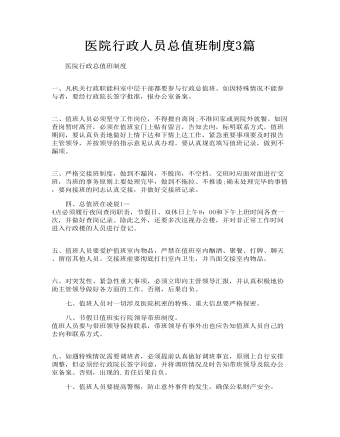
医院行政人员总值班制度3篇
二、值班人员必须坚守工作岗位,不得擅自离岗;不准回家或到院外就餐。如因查岗暂时离开,必须在值班室门上贴有留言,告知去向,标明联系方式。值班期间,要认真负责地做好上情下达和下情上达工作,紧急重要事项要及时报告主管领导,并按领导的指示意见认真办理。要认真规范填写值班记录,做到不漏项。 三、严格交接班制度,做到不漏岗,不脱岗,不空档。交班时应面对面进行交班,当班的事务原则上要处理完毕,做到不拖拉、不推诿;确未处理完毕的事情,要向接班的同志认真交接,并做好交接班记录。 四、总值班在凌晨1—4点必须履行夜间查岗职责,节假日、双休日上午8:00和下午上班时间各查一次,并做好查岗记录。除此之外,还要多次巡视办公楼,并对非正常工作时间进入行政楼的人员进行登记。 五、值班人员要爱护值班室内物品,严禁在值班室内酗酒、聚餐、打牌、聊天、留宿其他人员。交接班前要彻底打扫室内卫生,并当面交接室内物品。 六、对突发性、紧急性重大事项,必须立即向主管领导汇报,并认真积极地协助主管领导做好各方面的工作。否则,后果自负。

XX工业园区2023年工作总结和2024年工作思路
(二)科学破解要素制约,拓展园区发展空间一是抓科学评价。与经信条线按企业评价不同,园区尝试建立的按地块评价更能反映地块出让后的效益情况,更具实际意义。目前地块评价框架已经建立,大部分地块已纳入,但尚未实现全覆盖。2024年要拓宽数据来源,充分结合工业企业综合评价、地企调查等工作,利用市监、资规、税局等渠道,尽快完善地块评价体系。二是抓资源整合。对于低效的工业用地,综合运用电价差别等导向政策,仔细研究原有合同,与资规局等部门加强沟通和协调,由管委会主导,引导原业主配合将厂房出租给投资大、用地少、产出高、效益好的新项目,让土地恢复效益。三是抓容积率提升。对于高效工业用地,发展快速空间不足的企业,引导鼓励其充分利用现有的政策和渠道,通过容积率提升,拓展空间资源。
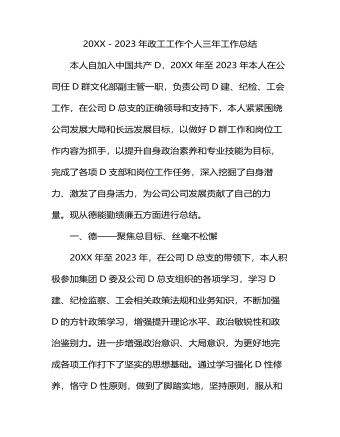
20XX-2023年政工工作个人三年工作总结
20XX年至2023年,我系统学习了《中国共产D纪律处分条例》《中华人民共和国监察法》等D内法规制度,深入研读了《廉洁自律准则》《纪律处分条例》《新形势下D内政治生活的若干准则》《D内监督条例》等D纪D规。每天利用业余时间,看阅D报、D刊,学习有关文件、时事政治和业务知识,记录了大量学习笔记,撰写了多篇心得体会。通过学习,有效提升了履职尽责能力。工作期间我能够主动协助纪检委员对D风廉政建设工作落实的监督,引导广大D员积极参加警示教育,严格执行D员领导干部廉洁从政的有关规定。近三年,公司D总支多次召开会议,全面传达学习上级D风廉政建设决定,分析D风廉政建设形势,部署D风廉政建设工作,对公司D风廉政建设和反腐败工作进行了责任分工,统筹推动D风廉政建设各项工作落实。将D风廉政教育内容作为D员组织生活、领导班子组织生活会的内容,推动D风廉政建设有效落实。
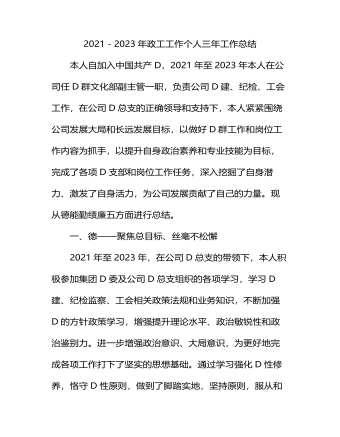
2021-2023年政工工作个人三年工作总结
2021年至2023年,我系统学习了《中国共产D纪律处分条例》《中华人民共和国监察法》等D内法规制度,深入研读了《廉洁自律准则》《纪律处分条例》《新形势下D内政治生活的若干准则》《D内监督条例》等D纪D规。每天利用业余时间,看阅D报、D刊,学习有关文件、时事政治和业务知识,记录了大量学习笔记,撰写了多篇心得体会。通过学习,有效提升了履职尽责能力。工作期间我能够主动协助纪检委员对D风廉政建设工作落实的监督,引导广大D员积极参加警示教育,严格执行D员领导干部廉洁从政的有关规定。近三年,公司D总支多次召开会议,全面传达学习上级D风廉政建设决定,分析D风廉政建设形势,部署D风廉政建设工作,对公司D风廉政建设和反腐败工作进行了责任分工,统筹推动D风廉政建设各项工作落实。将D风廉政教育内容作为D员组织生活、领导班子组织生活会的内容,推动D风廉政建设有效落实。

工业园区2023年工作总结和2023年工作思路
二、明年工作思路明年,园区将以“实干+专业”的工作思路,持续改进,主要目标是实现规模以上工业总产值重回增长通道,全年增速*%以上,围绕这一目标,主要做好以下几方面工作。(一)支持企业突破创新,提升园区企业层级一是要充分利用*等科技平台。落户一家,走访一家,行动一家,按照研发体系建立和专利申报—省科小—国科小—高新技术企业—规上企业——技术改造——各类专项的全链条发展路径规划,为企业做好谋划,也向企业提出要求。目标全年新增高企维持在*家以上。二是拓宽企业各级梯队。科技、技改、能源、规上、规下、商贸各条线都要努力拓宽各自的储备库,并做好梯次培育。重点是做好专精特新企业队伍建设,按照“*市创新型中小企业—*市专精特新中小企业—国家级专精特新小巨人”特色优势产业发展路径规划,*年再创建一批专精特新企业。
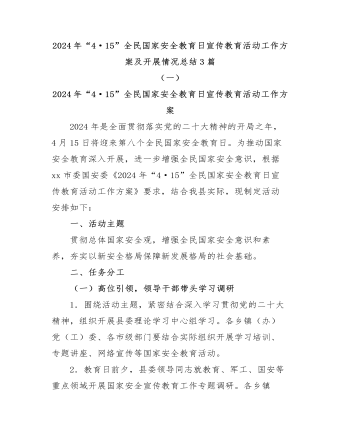
2024年“4·15”全民国家安全教育日宣传教育活动工作方案及开展情况总结3篇
社会宣传营造氛围。x月xx日,xx自治县开展了全民国家安全教育日宣传活动。活动现场悬挂了宣传标语、展出了宣传展板,向市民群众发放各种宣传资料,并现场为群众答疑解惑有关国家安全、反间防谍、反邪教、反恐防暴、网络电信诈骗、消防安全等方面的知识,切实提高群众对国家安全的了解。教育宣传进校园。x月xx日,xx县各中小学开展了国家安全教育日主题班会,xx县公安局民警围绕中小学生的学习生活实际,通过以案说法、现场互动等方式,向同学们宣传国家安全相关法律法规,引导学生了解国家安全形势,增强学生们的国家安全意识,让广大青少年从小就树立国家安全意识。携手企业全民参与。xx自治县创新宣传方式,携手饿了么xx分公司、xx外卖和xx、xx等x家快递公司,结合线下配送业务,把xxxxx余名骑手和快递员变为“国家安全宣传使者”,把相关宣传小卡片和短信息随着外卖订单和快递包裹的配送一并送到市民手中。

新人教版高中英语必修3Unit 5 The Value of Money- Discovering Useful Structure教学设计
Step 3 Meaning1. 过去将来时表示从过去某一时间来看将要发生的动作或存在的状态, 常用在宾语从句中。一般由“would/should +动词原形”构成。She hoped that they would meet again someday. 她希望将来有一天他们能再见面。2. was/were going to+动词原形: 表示过去将要发生或很有可能发生的动作, 常用于口语中, 表示预言、意图或者打算等。He was going to start work the following week. 他打算下星期开始工作。3. was/were about to do: 常用来表示即将发生的动作, “刚要/正要做……”。注意该结构不与任何时间状语连用。I felt that something terrible was about to happen. 我感到某种可怕的事情即将发生。4.was/were to do: 表示“曾计划做某事”, 如果表示“本来计划做某事, 动作没实现”, 则需用 “was/were to have done”。She said she was to have told me about the accident. 她说她本来想告诉我关于事故的事。5.Start, go, come, leave, see, meet等动词的过去进行时: 表示就过去某一时刻而言即将发生的动作。She was coming later. 她随后就来。I had just put on my overcoat and was leaving to visit a friend of mine. 我刚穿上外套要去看我的一个朋友。

新人教版高中英语必修3Unit 5 The Value of Money-Listening &Speaking&Talking教学设计
4. A:We’d like to have someone to say a word at the beginning to welcome the group.B:↙Who?A:We thought that you or Dr.Johnson might do it.B用降调说Who,其意思是问,对方想让谁在开场时致欢迎词。Step 6 Pronunciation---Practice1. Listen to the short conversation and mark the intonation with ↗, ↙ or ↙, ↗. Then discuss with a partner what they intend to convey by using different intonation.Owner: You know what ?↗ It’s a million-pound bank note↙.Waiter 1: Really ?↗(question)Waiter 2: Really !↙(unbelievable and surprised)Waiter 3: Really ?!↙↗(first question then surprised)2. Listen to the conversations. Underline the parts that are stressed and mark the intonation. Then talk about the implied meanings of the responses with different intonations. Listen again and repeat.1) Henry: It’s a nice suit.Owner: Oh, it’s perfect!↙(The intonation means it is very suitable for Henry.)2) Henry: Well, that’s very kind of you.Owner: Kind, sir ?↗(what you said is not right) No, it’s kind of you. You must come whenever you want and have whatever you like. Just having you sit here is a great honour !!↙(welcome you to come again)3)Henry:Well, to be honest, I have none. Oliver:(happily) What luck!(excited) Brother↗, what luck!↙(It means “Didn’t you hear it?”)Henry: Well, it may seem lucky to you but not to me!↗(angry) If this is your idea of some kind of joke, I don’t think it’s very funny. Now if you’ll excuse me, I ought to be on my way.↙(If so, I would leave.)Roderick: Please don’t go↙...(hope Henry can wait for a moment)Part B Viewing and Talking---Describe people’s changing attitudes in a film clipStep 1 Before-listening---Tell the filmYou are going to watch part of the film The Million Pound Bank Note. Look at these photos and guess what happens in the film.

新人教版高中英语必修3Unit 5 The Value of Money-Listening &Speaking教学设计
Step 4: Listen again and decide if the following statements are true (T) or false (F).1 It was the first time Chen Liyan's story was reported. T口 F口2 Chen found 10,000 yuan in a small plastic bag in Taiyuan railway station口 F口3 Wang Zheng apologized to Chen because he couldn't offer her more money. T口 F口4 Chen took out a large loan to cure her daughter, T口 F口5 Wang set up a fundraising website for Chen's daughter after Chen told him about her situation. T口 F口Step 5:After listening, discuss the questions.1 What kind of person do you think Chen Liyan is?Chen Liyan is generous and honest because she returned a large sum of money to the owner.2 Did Chen return the money because she didn't need it?No. She returned the money because it was the right thing to do. Evidence for this is that she refused to accept the reward money because she felt that it had not been earned. 3 Is it common for people to do what Chen did?It depends on the culture. In some countries it is quite common to return money that has been found. In other countries, people believe "Finders are keepers!" 4 How did Wang Zheng feel about the return of his money?He must have been very happy and relieved to have gotten his money back. We know this because he thanked Chen repeatedly and even offered her a reward.5 Why did Ma Dongbao tell Wang about Chen's family?He must have had great sympathy for Chen and her daughter and wanted to help them.'We know this because he arranged help for them. 6 How did the news reporter feel about Chen's actions?The news reporter felt that it showed that money wasn't the most important thing in life. We know this because the reporter told us that this is what Chen believes. and then said, “that's a great attitude to take."

新人教版高中英语必修3Unit 5 The Value of Money-Reading and Thinking教学设计一
Everybody wants to get wealth.In today’s material world,making money or becoming wealthy symbolizes a person’s success and capability. Many people just make every effort, pay any price to attain greater wealth. With money,they can buy nice, large apartments in nice neighborhood. With money they can own luxurious cars. Wealth seems to bring all happiness in life.But is wealth the only road to happiness? Not really. There are many things in the world, which are beyond the means of money, such as friendship, love, health and knowledge. People are so preoccupied with struggling for money that they have no time or would not take the time to form or maintain friendship. What happiness can they feel living as lonely miserable creatures without love or friends in the world even if they accumulate tremendous wealth?In my opinion, people can’t do anything without money, but money is not everything. What money will bring you depends on your personal belief and goal in life. If you are kind enough to help others, especially the poor, money is a good thing to you. With it, you can do much more for the benefit of people and your country, and it will add to your own happiness. If you want money just for your own needs, you’ll never be satisfied or happy. In a word,you should have money spent for more people. Only then can money be the source of your happiness.Step 8 Homework4 students in a group, one acts Roderick, one Oliver, one servant and the fourth one acts Henry Adams, then listen to the tape, pay more attention to the difference between American English and British English in pronunciation, stress, tone.

新人教版高中英语必修3Unit 5 the value of money-Reading For Writing教学设计一
【参考范文】Narrator:(Henry is smiling as he leaves the restaurant. As he is walking down the street, he sees a sign for a place that cuts hair. He decides to get it cut. )H=Henry;B=Barber;R=rude manH:Good afternoon, I'd like to get a cut, if I may. (The barber looks at Henry's hair and continues cutting another man's hair. )Er, I'd really like a haircut. As you can see it's much too long. B:(in a rude manner) Yes, I can see that. Indeed, I can. H:Fine, well I'll have a seat then. (He sits in one of the barber's chairs. The barber turns to look at Henry. )B:It's quite expensive here, you know!Are you sure you can afford it?H:Yes. I think so. (In comes the rude man. )R:Hey you there. I need a haircut quickly. Can you do me straightaway?B:All right, then, get in the chair and I'll see what I can do. R:Thank you. (sits down in one of the barber's chairs)H:Excuse me, but I was here first. Aren't you going to do my hair first?B:This man's in a hurry. H:Well so am I!I insist that you cut my hair first. B:OK, but I'll have to be quick. This gentleman is waiting. H:Thank you. (They both become quiet. After his hair is cut, the barber tells Henry how much he must pay. Henry shows the barber the bank note. )B:Why, Mr . . . (looks shocked)H:Adams. Henry Adams. I'm sorry, I don't have any change. R:You're that Mr Adams! Well,I'm glad I waited or I might never have known it was you. B:Why, Mr Adams, please don't worry!(wearing a big smile) Nothing to worry about!Nothing at all!Please come back any time, even if you only need too little hairs cut!It will be my honour to serve you!

新人教版高中英语选修2Unit 5 First Aid-Discovering useful structures教学设计
You have no excuse for not going.你没有理由不去。He was punished for not having finished his homework.他因未完成作业而受到惩罚。2.动词ing形式复合结构由物主代词或人称代词宾格、名词所有格或普通格加动词ing,即“sb./sb.'s+doing”构成。动词ing形式的复合结构实际上是给动词ing形式加了一个逻辑主语。动词ing形式的复合结构有四种形式:①形容词性物主代词+动词ing②名词所有格+动词ing③代词宾格+动词ing④名词+动词ingHer coming to help encouraged all of us.她来帮忙鼓舞了我们所有人。The baby was made awake by the door suddenly shutting.这个婴儿被突然的关门声吵醒了。Can you imagine him/Jack cooking at home?你能想象他/杰克在家做饭的样子吗?无生命名词无论是作主语还是作宾语都不能用第②种形式。Tom's winning first prize last year impressed me a lot.汤姆去年得了一等奖使我印象深刻。Do you mind my/me/Jack's/Jack leaving now?你介意我/杰克现在离开吗?Excuse me for my not coming on time.很抱歉我没能按时来。His father's being ill made him worried.他父亲病了,他很担心。We are looking forward to the singer's/the singer to give us a concert.我们盼望着这位歌手来给我们举办一场演唱会。
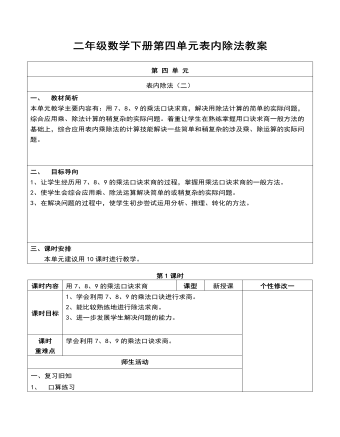
二年级数学下册第四单元表内除法教案
1、 谈话引入新课六一快到了。小朋友们在老师的带领下忙着布置自己的教室呢!可是他们遇到了一些数学上的问题,你能帮他们一快解决吗?2、教学例1。(1)、投影出示主题图引导学生仔细观察。说说他们遇到了什么问题?(2)、引导学生解决问题并列出算式。板书:56÷8(3)、引导学生得出算式的商。问:你是怎么计算的?(想乘算除)(4)、学生独立解决:要是挂7行呢?你能够解决吗?学生说出自己的计算结果,并把求商的过程跟大家说一说。2、 小结:在今天的学习中我们不仅帮小朋友们解决了数学问题,而且还进一步学会了利用乘法口诀来求商。在以后的除法中只要大家能够熟记口诀,就能很快算出除法的商了。
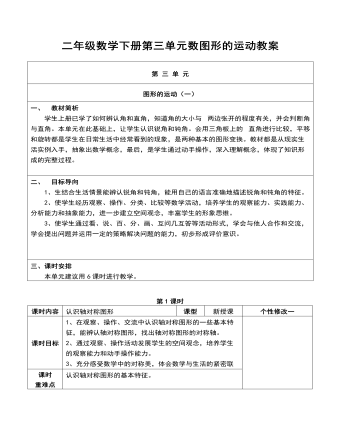
二年级数学下册第三单元数图形的运动教案
一、游戏活动激趣,认识对称物体1、游戏“猜一猜”:课件依次出示“剪刀、扫帚、飞机、梳子”的一部分,分男、女生猜。2、认识对称物体:1)师质疑:为什么女生猜得又快又准呢?2)小结:像这样两边形状、大小都完全相同的物体,我们就说它是对称物体。(板书:对称)二、猜想验证新知,认识轴对称图形(一)初步感知对称图形1、将“剪刀、飞机、扇子”等对称物体抽象出平面图形,让学生观察,这些平面图形还是不是对称的。2、师小结:像这样的图形,叫做对称图形。(板书:图形)(二)猜想验证对称图形1、猜一猜:出示“梯形、平行四边形、圆形、燕尾箭头”等平面图形,让学生观察。师:这些平面图形是不是对称图形?怎样证明它们是不是对称图形?
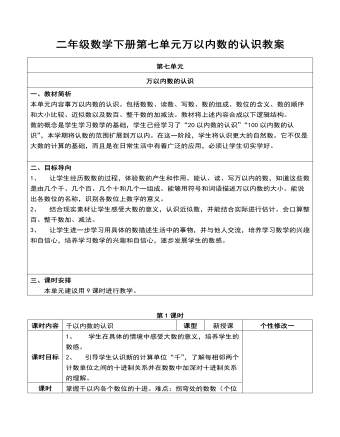
二年级数学下册第七单元万以内数的认识教案
一、复习导入1、口答:最大的一位数是几?最小的两位数是多少?这两个数相差多少?2、数数:10个10个地数,从10数到100; 1个1个地数,从91数到99; 问:99加1是多少?3、导入:你会从100开始接着往后数吗?今天开始我们将要学习更大的数,下面请你们观察这幅图。二、讲授新课1、出示主题图。(1)观察这幅图,说一说画面上正在发生什么事情?(2)看着画面你想知道什么问题?引导学生估算画面上的体育馆大约能坐多少人?2、板书课题:1000以内数的认识。3、教学例1。(1)数一数。每人数出10个小方块,说说你是怎么数的?板书:一个一个地数,10个一是十。




